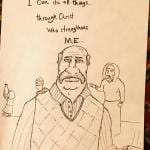I’m over at Stand Firm this morning.
In all my sojourning around YouTube looking for interesting stuff to alarm and delight me, I lost several hours listening to a person who I believe is very famous—she’s one of Oprah’s go-to people—sharing with the wide world an important discovery she made. In brief, her testimony goes something like this: She was very busy, over-busy, because she is a person who knows how to get things done. She is terrible at saying no because she’s super competent and also likes to make people happy. But then one day it was just too much and she couldn’t do it all anymore. A friend gave her permission to take back her life, which she did by realigning everything. She went through all the components of her identity and figured out which of them were essential for her. No one else could be a mother to her children, so that was obviously important, or a wife to her husband, or a best friend to her best friend. All the other things that she does are not crucial and so now she feels free to let them be secondary. You only have this one life, she concluded as so many do, and you don’t have that many times that you can reset it.
In all the snatches of interviews I watched, this person was always billed as a Christian. I was, therefore, interested to see what she had to say about the Christian life, so I watched half an hour of something that was called a “Bible Study” wherein she—sitting outside of some cozy woodsy cabin—explained that we all have a “besetting sin” or a “shadow side,” for her its pride and gluttony, that we have to battle against because whatever it is will keep us from being our best selves for all the important people in our lives, and for our own happiness.
So anyway, this is the old testament reading for this morning and I think it is pretty great:
“The Lord your God will raise up for you a prophet like me from among you, from your brothers—it is to him you shall listen—just as you desired of the Lord your God at Horeb on the day of the assembly, when you said, ‘Let me not hear again the voice of the Lord my God or see this great fire any more, lest I die.’ And the Lord said to me, ‘They are right in what they have spoken. I will raise up for them a prophet like you from among their brothers. And I will put my words in his mouth, and he shall speak to them all that I command him. And whoever will not listen to my words that he shall speak in my name, I myself will require it of him. But the prophet who presumes to speak a word in my name that I have not commanded him to speak, or who speaks in the name of other gods, that same prophet shall die.’And if you say in your heart, ‘How may we know the word that the Lord has not spoken?’—when a prophet speaks in the name of the Lord, if the word does not come to pass or come true, that is a word that the Lord has not spoken; the prophet has spoken it presumptuously. You need not be afraid of him.
At this point in the text, Israel has had a hard time with Moses, and with God for that matter. They had very much wanted to get out of slavery in Egypt. They were exhausted by their burdens, miserable about having to make bricks all the time without straw, unhappy about the slavedrivers pushing them along and threatening and then beating them. And of course, when they had to throw their babies in the river, that was the worst. So they cried out to God, and as you know, he said, ‘You can change your life and not be so busy all the time, it’s up to you. You have this one life and what are you going to do? Waste it on being unhappy? Don’t you want to be a great mom? Don’t you want to enjoy your children and your life?’ And so, of course, the people of Israel were delighted because they hadn’t thought of it like that, and so they went and told Pharaoh that they wouldn’t be making bricks anymore. They downloaded the Oprah app and learned how to meditate so that when the slavedrivers came along to beat them, they were able to remind themselves that all pain is a subjective experience that can be transcended by enlightenment—oh wait, maybe I am mashing several spiritual teachings together.
I’m kidding, of course. The people of Israel needed help to get out of Egypt, but they also needed help because they were slaves to sin, and that was chiefly why they were often so frustrated with God and Moses all those long years in the desert. Being enslaved by Pharaoh, it turned out, was just an icon of the bondage that each of us has to ourselves. We are sinners, we are enslaved by deep entrapping self-love. We can’t get out of it. It drives us along, straight into the eternal embrace of the devil and all his works.
Still, if you spend any amount of time listening to the spiritual teachers of today you will hear a kind of language of sin, a shadow version, one might call it…. Read the rest here!













